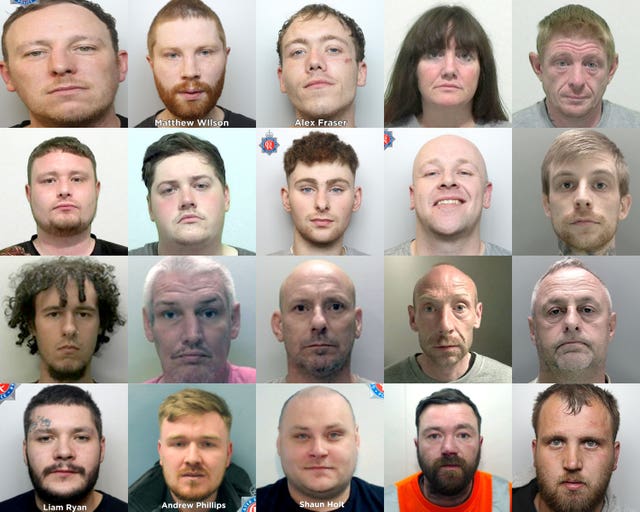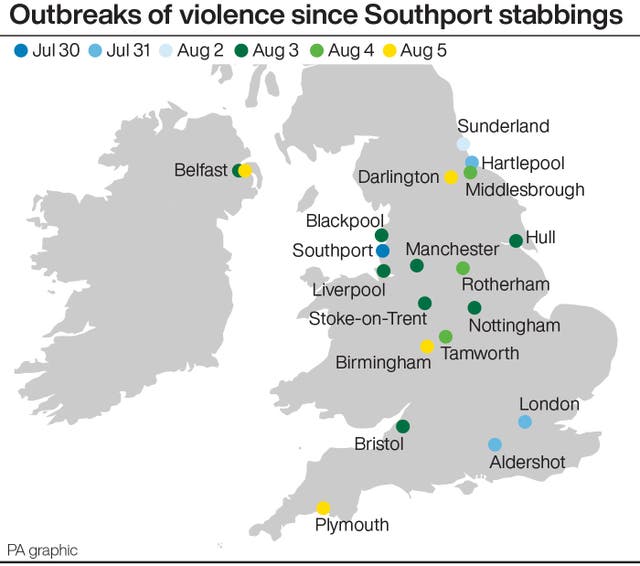Publication of law firms as targets could be terrorism, top prosecutor warns
Director of Public Prosecutions Stephen Parkinson said he was aware of one case of alleged terrorism which is ‘actively under consideration’.

The publication of immigration law firms as potential targets for disorder could be considered a terrorism offence, and one case of alleged terrorism is “actively under consideration”, the Director of Public Prosecutions has said.
Stephen Parkinson told the PA news agency no terrorism charges had yet been brought in connection with violence across the country as police are steeled for as many as 100 events of disorder on Wednesday.
Another 20 people were charged overnight, the Crown Prosecution Service said, bringing the total to more than 140, as police chiefs continued to warn rioters they could “expect a knock at the door”.
Police are understood to be preparing to respond to more than 100 planned protests and potentially around 30 more counter-protests on Wednesday, with gatherings anticipated in 41 of the 43 police force areas in England and Wales.
A police source said: “Today is probably going to be the busiest day of the week, into the evening.
“Tonight, we think it’s looking like a credible picture. We are preparing for activity across 41 forces.”
Dozens of police officers in Aldershot rushed in to separate opposing groups after tempers flared on Wednesday evening.
Protesters holding “Stand Up To Racism” placards had been chanting “refugees are welcome here”.
A group across the road had been chanting back “stop the boats” and some walked towards the Stand Up To Racism demonstrators, stopping traffic, and angry shouting occurred.
Northamptonshire Police said three people had been arrested for public order offences in Northampton, and were in custody, and no members of the public or police had been injured.
The force earlier said about 150 counter-protesters had gathered at the junction of Kettering Road and Clare Road, and that police were asking people to avoid the area.
Mr Parkinson said extradition would “of course” be considered in relation to people posting online about inciting UK riots while being out of the country.
He also said there “will be short, medium and long-term consequences” connected to the recent unrest but “it is too soon to say” if it will have a knock-on effect on the justice system.
Sir Mark Rowley, the head of the Metropolitan Police, said threats against immigration lawyers were “at the centre of our planning tonight”, adding: “We will not let the immigration asylum system be intimidated.”

“The fact that it’s organised groups that might be motivated by ideological reasons, the fact that they’re promoting potentially very serious offences – that’s the sort of instance where we might want to consider terrorism charges.”
Asked whether anyone had been charged with terrorism offences or were under consideration for being charged, the DPP said: “No one’s been charged with a terrorism offence yet.
“I’m aware of one case which is actively under consideration.
“We’re working very closely with counter-terrorism police, so I know there are a number of inquiries that are potentially underway – that includes scouring the internet and social media, looking out for the potential for terrorism offences to be committed.”
Mr Parkinson said all 111 people arrested in connection with disorder in Whitehall last week have been bailed and was expecting to receive files from police to review “by early next week”.
Resources are being shared around the country as forces respond to intelligence, with the Metropolitan Police understood to be sending some officers to Manchester while others in the South East are also travelling to support colleagues in North East and North West forces.
Meanwhile, those arrested continued to appear in court on Wednesday, some reduced to tears as they heard they would be kept in prison before their next hearings.

Mr Parkinson said he does not believe courts currently need to sit overnight and at weekends to deal with those charged in connection with the recent unrest, but it is something they are “reviewing constantly”.
Asked if the current disorder could have a knock-on effect with unrelated charging decisions and cases being dealt with as prosecutors are focused on the cases connected to the disorder, he said: “It’s too soon to say. So far, there’s been 120 charges. In context, we prosecute 400,000 cases a year.
“So, we are coping, obviously having said that, you know, the entire focus of many of our prosecutors is on this issue and that’s bound to have knock-on consequences. I don’t want to pretend otherwise.
“So, there will be short, medium and long-term consequences as a result of this disorder. But, you know, we will get back to normal, hopefully before too long.”
The DPP issued a warning to people thinking of retweeting or sharing online communications in connection with the disorder, saying they are “potentially committing criminal offences themselves”.
“I think people need to be really aware that if they retweet or share those communications, they are potentially committing criminal offences themselves, the offences are around publication of material.
“If you retweet something, you are republishing it. We have dedicated police officers whose sole task is to scour the internet, scour social media. This is what they’re focusing on.
“So, if you retweet or you reshare those communications, you will be picked up and you may expect a visit from the police, so please don’t do it.”





